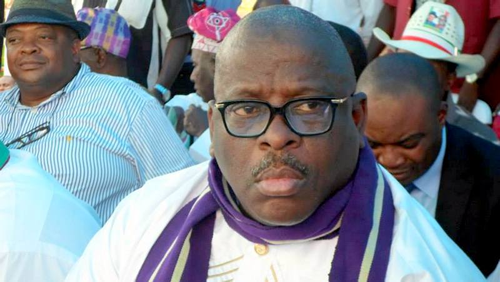Justice Okon Abang of the Federal High Court, Abuja, on Thursday, restrained the Federal Government from extraditing Senator Buruji Kashamu to the United States (U.S.) to answer allegation of his complicity in illicit drug trade.
Delivering judgement, Justice Abang held that neither the Federal Government nor any of its agents could validly initiate extradition proceedings against Kashamu in view of subsisting judgements and orders in favour of the plaintiff, which had remained unchallenged.
Abang, particularly noted that the judgement delivered by the Federal High Court, Lagos on January 6, 2014 (in suit No:49/2010) and another judgement of July 1, 2016 given by the Federal High Court , Abuja (in suit No: 479/2015), which prohibited Kashamu’s extradition on account of the U.S. drug allegation, were still subsisting.
While Kashamu is the plaintiff in the suit marked: FHC/ABJ/CS/530/18, the Attorney General of the Federation (AGF) and the National Drug Law Enforcement Agency (NDLEA) are defendants.
Kashamu had, in the suit, challenged the propriety of a letter by Shehu Bodinga of the Central Control Unit in the AGF’s office, requesting the U.S. embassy in Nigeria to forward a fresh extradition application after the judgement by Justice Gabriel Kolawole (then of the Federal High Court, Abuja) in suit No: 479/2015, voiding an earlier extradition proceedings.
Justice Abang held that Justice Kolawole’s judgement, in nullifying the earlier extradition proceedings, was based on two judgments of the Federal High Court in suits Nos: 49/2010 and 508/2015, declaring as unlawful all attempts to extradite Kashamu in view of the judgements by two British courts which held that he was not the person involved in the drug crime in the U.S.
The judge noted that while the AGF successfully challenged the court’s decisions in suit 508/2015, which was set aside in the appeal marked: 1030 and 1030a on May 4, 2018, the AGF failed to appeal the other judgement in the suit No: 49/2010.
Abang held that, since the judgement, in suit No: 49/2010 which contained a specific order restraining the AGF from exercising his power of extradition under the Extradition Act, was not challenged, it remained alive along with the restraining order.
The judge also held that since the subsequent judgement by Justice Kolawole was also not appealed, it remained subsisting and binding on all parties.
In the earlier part of the judgement, Abang set aside the letter written by Bodinga, dated July 14, 2016 on the grounds that neither the AGF nor his agent had the power under any law to apply to a foreign country, with which Nigeria has extradition treaty, to bring a request for the extradition of a citizen of this country where that country has not made such an application.
The judge noted the decisions of the Court of Appeal in the two judgments, on which Justice Gabriel Kolawole was based, appeared conflicting.
He said the Court of Appeal’s decision of Sept. 20, 2018, dismissing the appeal marked: 479/2015, which was an appeal against the judgment in suit No: 49/2010 was the most recent decision, which he was bound to abide by.
“The effect of the Court of Appeal dismissing the appeal against the judgment in suit No: 49/2010 is that the said judgment has validated in all its ramifications, inclusive of the restraining order in that judgment.
“It is my humble view that the AGF has no discretion in this matter. With the greatest respect to the AGF, he has no choice in this matter.
“The fact that the restraining order in the judgement in suit 49/2010 dated January 6, 2014 is still valid and subsisting, it is not a matter of sentiment.
“In fact, it is not a political issue. We don’t practise democracy in court, no matter how the politicians look at it. The politicians can look at it the way it favours them.
“But, sitting as a court of law, where there is no appeal against a judgement, that judgement subsists.
“This is an issue of law. Where there is no appeal against a judgment, there is nothing anybody can do in a democratic setting.
“If the restraining order ought not to have been made, the AGF ought to have appealed against it.
“The Attorney-General of the Federation, with the greatest respect to him, cannot pretend that the restraining order is no longer subsisting.
“The 1st defendant (AGF) cannot assume that the order was not made in good faith even when he participated in the proceedings.
“The 1st defendant appealed successfully and got judgment in suit No: 508/2015, that was set aside. Why did the AGF not appeal against the judgement in suit No:49/2010?
“Why did the AG not appeal that judgement even when the Court of Appeal recently dismissed an appeal against the judgement?,” he asked.
The judge said the the current AGF was not in office when the judgment was delivered on January 6, 2014. “I really sympathise with him.”
“In my respective view, he can not now seek to take steps against that judgement when his predecessor in office did not see any need to appeal against the judgment or did not even see anything wrong with the judgment.
“Except if the decision of the Court of Appeal on September 20, 2018, dismissing the appeal against the judgement in suit 49/2010 is validly set aside on an appeal to the Supreme Court, the AGF cannot validly take steps that run contrary to the subsisting judgement of this court.
“That will be an invitation to anarchy,” the judge ruled.


























